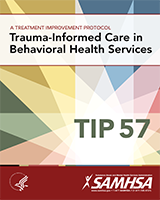From: Chapter 5, Clinical Issues Across Services

Trauma-Informed Care in Behavioral Health Services.
Treatment Improvement Protocol (TIP) Series, No. 57.
Center for Substance Abuse Treatment (US).
Rockville (MD): Substance Abuse and Mental Health Services Administration (US); 2014.
NCBI Bookshelf. A service of the National Library of Medicine, National Institutes of Health.